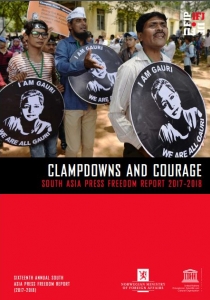
This document has been produced by the International Federation of Journalists (IFJ) on behalf of the South Asia Media Solidarity Network (SAMSN). Afghan Independent Journalists’ Association; Bangladesh Manobadhikar Sangbadik Forum; Federation of Nepali Journalists; Free Media Movement, Sri Lanka; Indian Journalists’ Union; Journalists Association of Bhutan; Media Development Forum Maldives; National Union of Journalists, India; National Union of Journalists, Nepal; Nepal Press Union Pakistan; Federal Union of Journalists; Sri Lanka Working Journalists’ Association. This document has been produced with support from the United Nations Educational, Scientific and Cultural Organisation (UNESCO) and the Norwegian Ministry of Foreign Affairs (NMFA). The views and contents expressed herein are those of the IFJ and can in no way be taken to reflect the official opinion of UNESCO and NMFA. The author will be responsible for the choice and presentation of the facts contained in the paper and for the opinions expressed therein, which will not be necessarily those of UNESCO and NMFA and do not commit the Organisations, the designations employed and the presentation of material throughout this book will not imply the expression of any opinion whatsoever on the part of UNESCO and NMFA concerning the legal status of any country, territory, city or area, or its authorities or concerning the delimitation of its frontiers and boundaries. As we fight for journalist rights for another year, there’s a pervading sentiment emanating through the collective discourse of media workers in South Asia.It is audible in the street demonstrations and protests of media workers. It is there, between the lines, in journalist union statements and in formal calls to government to do more for safety and protection of media workers.It is written boldly and plainly in the protest placards and banners carried by activists in cities and regional centres; raw emotions and brave statements etched out each and every time yet another attack or killing takes target on a journalist. It is evident in the robust defence that plays out on social media against the obscene trolling of women journalists and secular bloggers in the online space
